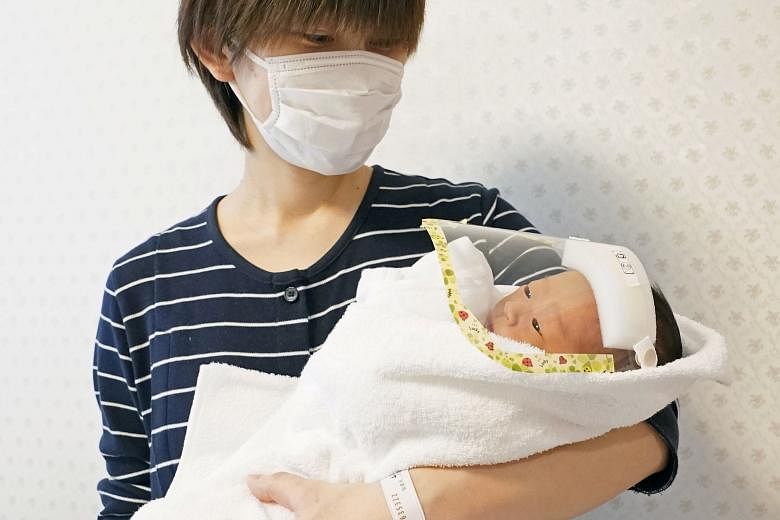Tokyo resident Eri had a miscarriage in March, just as Japan's coronavirus crisis was gathering pace. As she begins her fourth in-vitro fertilisation (IVF) attempt this month, she is torn between her desire for a child and fears about the virus.
"If the outbreak does not come under control, I'm scared of getting pregnant," says the 36-year-old social worker.
She is not alone. Concern is mounting that the pandemic is deterring couples from parenthood, a trend that is adding to the demographic and economic challenges facing a fast-ageing society where births were at a historic low even before Covid-19.
While the impact on straightforward conceptions is unclear, doctors say there has already been a sharp fall-off in IVF since last month, after the Japan Society for Reproductive Medicine recommended patients be given an option to delay treatment as Covid-19 infections rose.
"There will be a hit to Japan's birth rate from next year and beyond," says Dr Satoshi Ito, who heads a fertility treatment clinic in Tokyo.
Japan's rate of population decline is among the fastest in the world, with deaths rising to a post-war high of 1.38 million last year. Combined with a low fertility rate of 1.4 births per woman, the demographic pressures are putting a severe burden on public finances.
With many couples stuck at home and spending more time together, Japan might have harboured hopes of a coronavirus baby bonanza.
The more likely scenario, health experts warn, is people having less sex because of concerns over the future and women holding off becoming pregnant as Covid-19 wreaks havoc on the world's fourth-largest economy.
Historically, economic factors such as job security and income have had a significant impact on birth rates and sexual activity in Japan and other developed countries, say analysts.
Japan's birth rate has been declining since the mid-1970s, alongside two decades of economic stagnation, but it saw a brief rebound between 2006 and 2008 as unemployment decreased and the economy picked up.
The pandemic is expected to plunge Japan into a deep recession, with some economists expecting nearly 10,000 jobs to be lost this year despite Prime Minister Shinzo Abe lifting a state of emergency for much of the country this week.
Dr Yoshimasa Asada, who runs three fertility treatment centres in Japan, says: "Japan is in a state of emergency with the outbreak, but an emergency declaration was long overdue for the declining birth rate. Now, with the pandemic, it's overwhelming."
Even before the outbreak, Japanese government research and surveys had shown a rise in the number of couples in sexless relationships, blamed in part on the increasing stress of juggling careers. The National Fertility Survey has also found that the virginity rate among young adults who have never married is more than 40 per cent.
According to a study published last year by researchers at the University of Tokyo, uncertainty about earnings and employment played a particular role in the high incidence of virginity among young Japanese men, suggesting they still consider themselves as breadwinners.
"With the pandemic darkening Japan's economic outlook, the outbreak could leave young men even less inclined to form sexual relationships," says Mr Kenji Shibuya, a co-author of the study who is now a professor at King's College London.
"Staying at home could have a positive impact on partnerships but that will be limited to the economically well-off," he says. "The negative impact is likely to be bigger for many of the people, particularly among the young, who cannot increase fertility due to economic factors."
Covid-19 arrived just as the government was expanding financial support for costly fertility treatments in a bid to raise the fertility rate to 1.8 by 2025.
Under Mr Abe, who has made reversing demographic decline a priority, subsidies for IVF treatments have been doubled and are available for male patients as well.
The latest government data shows that one in 16 babies in Japan is conceived via IVF, although doctors say the ratio is higher if other forms of treatments such as artificial insemination are included. That compares with 2 per cent of babies born in the United States and the United Kingdom.
"There will be people who will have to give up treatment as their income falls and government subsidies may not be available for some since they are based on last year's income," said Ms Akiko Matsumoto, who heads Fine, a non-profit organisation that supports women receiving fertility treatments.
Dr Asada says: "If this situation continues for two to three months, I think fertility clinics will go bankrupt."
At Dr Ito's clinic, roughly half of his patients have decided to delay their IVF treatment. But for older women, postponement is not an option.
For now, Eri plans to carry out the egg retrieval phase of the IVF process, but has not made up her mind on whether to go ahead with embryo transfer. Despite fears about the virus, she says she cannot afford to ignore the risks of delay.
"I've tried IVF three times now and it's not easy. It's a battle against time," she adds.
FINANCIAL TIMES











